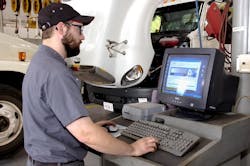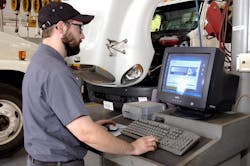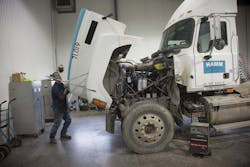Trucking is waiting for a skilled technician workforce
This is not a new problem, of course. My colleague Sean Kilcarr has written on the subject a number of times. Late last year, Sean reported on consulting firm Accenture’s 2013 Skills and Employment Trends Survey: Perspectives on Training survey of 400 executives at large U.S. companies.
That survey showed a significant skills gap in the workforce of today. According to the survey, 46% of businesses are concerned they won’t be able to find employees with the skills necessary within the next two years. Of those firms, 51% expect to increase investments in training while 35% say they haven’t invested enough in training.
(You can read more about the report here)
“It’s clear that U.S. businesses are looking to take a more active role in solving the skills challenge, and that failing to do so can result in significant business consequences,” said David Smith, senior managing director of Accenture’s talent and organization practice. “Developing more effective and targeted training programs is a critical element in improving the skills of the workforce.”
In the trucking industry, many firms have reached out to technical schools to develop programs that can train the technicians of tomorrow.
Mack has partnered with WyoTech to offer advanced training for trucking technicians. Students enrolled in the program are trained specifically to work on Mack Trucks, including its engines, electrical and electronics, emissions, powertrain and chassis components. Volvo Trucks has a similar program with WyoTech.
Both companies award scholarships to help students pay for the education.
Peterbilt has teamed with Universal Technical Institute (UTI) to create the Peterbilt Technician Institute program. The program is exclusive curriculum focused on comprehensive service technician training, the company said. The program provides students with classroom and hands-on instruction of total vehicle diagnostics, maintenance and repairs, as well as essential education in customer service, dealership shop operations and laws and regulations.
These are just a few examples. Plenty of companies donate time, expertise, and money to help train the next generation of technicians.
“Two years ago, as the auto industry came roaring back, Andra Rush opened up a manufacturing firm in Detroit. She knew that Ford needed parts for the best-selling truck in America, and she knew how to make them. She just needed the workforce. So she dialed up what we call an American Job Center – places where folks can walk in to get the help or training they need to find a new job, or better job. She was flooded with new workers. And today, Detroit Manufacturing Systems has more than 700 employees,” he said.
Obama has put vice president Joe Biden in charge of reform efforts on the nation’s training programs to ensure they are training students with the skills American companies need.
“That means more on-the-job training, and more apprenticeships that set a young worker on an upward trajectory for life,” Obama said. “It means connecting companies to community colleges that can help design training to fill their specific needs. And if Congress wants to help, you can concentrate funding on proven programs that connect more ready-to-work Americans with ready-to-be-filled jobs.”
Trucking is proving that such programs can and do work. And given the important role that trucks play in the nation’s economy, ensuring technicians have the proper skills to keep these ever-increasingly more complicated vehicles running should be at the top of the list.
There are plenty of jobs available if Congress wishes to toss some funding for training trucking’s way.


